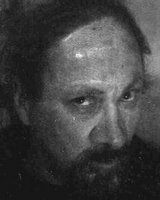A Visit to St. Nick
 by Ed Rehmus
by Ed Rehmus
In Earthly Powers, Anthony Burgess describes the libretto of an opera based on the life of St. Nicholas, borrowed largely from an account by Anatole France. Since few people know anything about this peculiar person, other than that he is the patron saint of children (and shipwrecked sailors), it might be interesting to take a closer look. The opera is far too long to quote verbatim from the novel, but briefly this is the gist of the plot up to the end of the first act.
The story begins, somehow, with the corpses of Bishop Nicholas' three sons (Mark, Matthew and John) who have been put into a pickle barrel, whereupon, because of the pickle acid, they have been resurrected. The first son turns Nicholas's house into a brothel & Nicholas is tempted by sins of the flesh. Nicholas invokes Jesus Christ, who appears as the naked god, Pan, whereupon the poor man yields to his weaknesses. Afterwards, he flagellates himself & is thereby purified enough to be able to attend the Council of Nicaea in order to denounce the Aryan heresy. In case you've forgotten, the Aryan heresy suggests that the Father and the Son are the same substance: Homoousia. Whereas the True Faith insists that they are only of similar substance: Homoiousia, thus proving the importance of an iota.
Meanwhile the second son is busy forging documents to denounce Nicholas as an even worse heretic; At the Council, the women of the town, appear in order to ask for prayers for their men who are in a storm at sea. The Council, of course, wants to throw them out for disrupting their holy deliberations, but jolly old St. Nick intercedes for the sailors' wives by wrestling with an Aryan bishop. At this point Matthew reveals the documents proving that his father has stated that the only true God is Venus. Nicholas is ecclesiastically disgraced just as all the ships at sea go down.
In the second and final act of the opera, Nicholas, after a stint with sackcloth and ashes, has been reinstated by the Pope and is now once again a full bishop. However, it seems that a number of German tribes have been converted to Xtianity by Arians and the heresy is going full blast. John, the third son, is all for going to Germany in order to torture and kill heretic women and children. Nicholas argues that theirs is a religion of love, but John points out that "These are foul heretics who believe Christ to be co-eternal with the Father!" So Nicholas is persuaded to join in the holy war, though he soon regrets it. He asks heaven to send down Love, and "Venus herself appears, as goddess of brothels for soldiers." Mothers are screaming for miracles and one of them hands Nicholas the bloody corpse of her child. Nicholas, with the child in his arms now asks God why he brought the three wicked sons back to life in the first place and when there is no answer, "You are a God of Hate, a God who murders the innocent!" There is no reply and the curtain descends.
Thus, to this day, the red suit represents Nicholas's sins of the flesh, which he atones for with the ashes of chimneys, while the bag upon his back is his burden of shame. Of course, in our time, we no longer honor shame, so the bag merely contains the poisonous fruits of materialistic Capitalism.












No comments:
Post a Comment